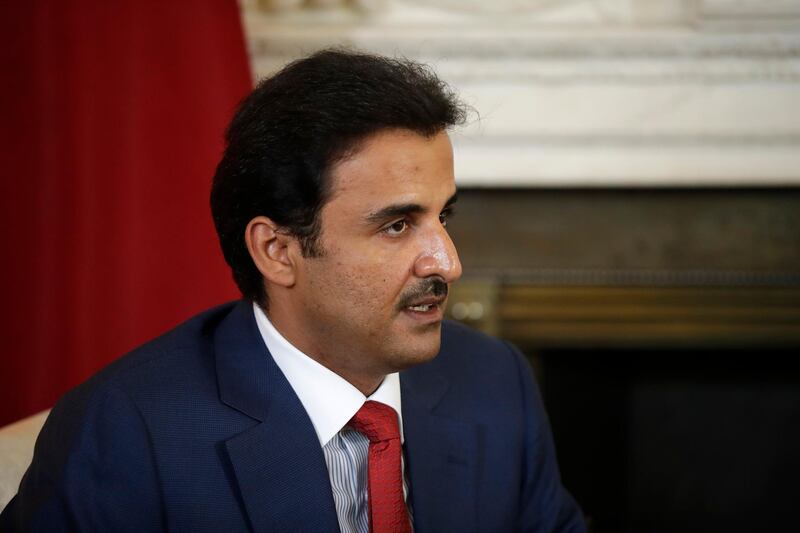Ever since the crisis over Qatar’s links to Islamist terrorist groups erupted last year, Doha has proved itself to be adept at persuading the international community that its activities are legitimate.
Despite compelling evidence that Qatar has a long and proven history of financing and supporting extremist organisations, ranging from the Muslim Brotherhood to Hamas, the Qataris, with the help of an army of highly paid public relations advisors in London and Washington, have managed to temper the criticism by claiming they do no more than support political activists who just so happen to take an opposing view to the political mainstream.
Supporting groups like Hamas, the Qataris contend, is the best way to resist Israel’s occupation of the Palestinian territories, while they claim that that Muslim Brotherhood is nothing more than a political organisation.
Both these claims fly in the face of well-established facts. The Muslim Brotherhood's tolerance of Islamist terror cells in Egypt during its short-lived spell in government was one of the main reasons the Morsi government was forced from power. And Hamas's reliance on terror tactics, as well as its close links to Tehran, has resulted in it being deemed a proscribed terrorist organisation by the US and the EU.
Until now the Qataris have managed to deflect criticism over their conduct, to the extent that the Emir, Sheikh Tamim bin Hamad Al Thani, recently received a warm reception during a visit to London, where he met a host of senior government officials, including Prime Minister Theresa May. Hardly a word was said about Qatar’s links to Islamist terrorism. Instead, the biggest controversies the Emir faced were renewed allegations of corruption concerning the Qatari bid to host the 2022 Fifa World Cup.
But the Emir is unlikely to be receiving many more warm welcomes on the world stage as the true picture concerning Qatar’s global political alignment starts to emerge.
Perhaps the most revealing indication of Qatar's position came earlier this month when Doha announced it was to invest $15 billion in Turkey at a time when the government of Turkish President Tayyip Erdogan is involved in a rancorous trade war with Washington.
Mr Erdogan shares the same extremist world view as the Qataris, supporting a wide variety of Islamist terror groups, including Hamas and the Muslim Brotherhood.
But Qatar’s financial intervention in Turkey will not be welcomed in Washington at a time when Ankara has accused the Trump administration of waging an economic war against Turkey over its treatment of a US pastor who is being tried on terrorism charges.
Pastor Andrew Brunson, who is an American citizen, has been detained in Turkey for nearly two years over alleged links to outlawed political groups and now faces charges that he was involved in a plot against the Turkish president.
Mr Brunson’s treatment is similar to the fate that has befallen tens of thousands of Turkish citizens under Mr Erdogan’s increasingly repressive rule.
In an attempt to secure the pastor's release, US President Donald Trump has imposed punitive tariffs on imports of Turkish steel and aluminium, prompting an economic crisis, with the Turkish lira plummeting.
Nor is there any sign of Mr Trump backing down on his uncompromising response. “I think it’s very sad what Turkey is doing,” the US president recently remarked. “I think they’re making a terrible mistake. There will be no concessions.”
Qatar’s decision to provide Turkey with economic support in such circumstances, therefore, not only illustrates the closeness of its relationship with Mr Erdogan's regime. It provides an unequivocal demonstration of where Qatar’s real loyalties lie.
For all Doha’s insistence that it is a loyal and reliable ally of Washington, the truth is that when that so-called loyalty is tested, the Qataris will always side with America’s opponents.
Qatar’s intervention on behalf of Turkey has not gone down well in the US, where John Bolton, the administration’s hawkish National Security Advisor, has already criticised Qatar’s display of financial support. And tensions between Doha and Washington will only deepen further if the Qataris continue to maintain their friendly relations with Iran at a time when the Trump administration is gearing up to impose further sanctions against Tehran.
The other embarrassing revelation concerning Qatar's links to Islamist extremists is the political controversy that has erupted in London this summer over Labour leader Jeremy Corbyn's close ties with Hamas.
Mr Corbyn has spent his entire political career associating with terrorists, from the IRA to Hezbollah. But questions over his fitness to lead the Labour party have arisen over his ties with Hamas, especially revelations concerning a conference the Labour leader attended in Doha where he shared a platform with a convicted Hamas terrorist.
Mr Corbyn shared a panel with Husam Badran, who was jailed for 17 years in Israel for his role in orchestrating a string of terrorist attacks that killed more than 100 people. He was released as part of a prisoner swap for Gilad Shalit, an Israeli soldier who had been taken hostage by Hamas.
Also present at the conference were Khalid Mishaal, the former political leader of Hamas who has been granted political asylum by the Qataris, and Dr Abdul Aziz Umar, who received seven life sentences for terrorism offences.
In Britain, Mr Corbyn’s willing association with such personalities has yet again raised questions about his political acumen.
But for Qatar, the controversy highlights Qatar's close association with individuals and causes that are roundly condemned by the rest of the civilised world.
And the problem Qatar faces now is that, following its intervention in Turkey and the latest publicity surrounding its links with terror groups like Hamas, Doha’s protestations of innocence will no longer bear close scrutiny.
Con Coughlin is the Daily Telegraph’s defence and foreign affairs editor





